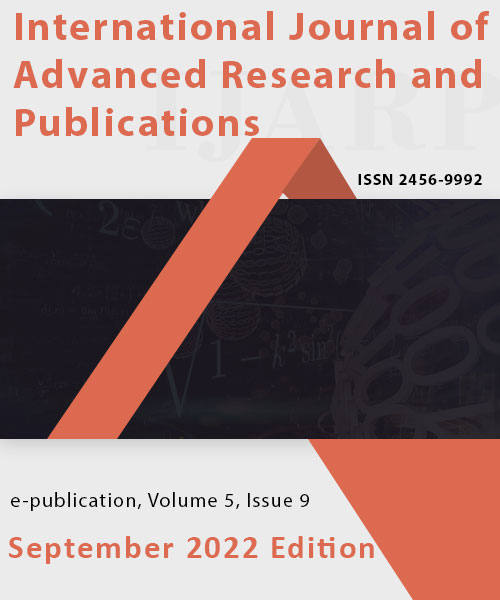Development And Validation Of Questionnaire For Measuring Senior High School Fundamental Scientific Research Skills
 Volume 5 - Issue 9, September 2022 Edition
Volume 5 - Issue 9, September 2022 Edition
[Download Full Paper]
Author(s)
Christian M. Santiago, Dominga C. Valtoribio
Keywords
Fundamental Research Skills, STEM Education, Science Education, Senior High School, Research Policy
Abstract
With the advent of the introduction of research courses in the basic education program in the Philippines, varied measures on the attainment of learning outcomes have been in debate, one issue is the sizing of student scientific research skills after completion of research subjects. However, there has been no notable instrument developed and validated that measures fundamental research skills in basic education, especially in senior high school. Thus, this study aimed to develop and validate such an instrument. The process includes literature and resources review, formulation of new items, language and content validation, factor analysis, reliability, and concurrent validity testing. The instrument was implemented for 229 Grade 11 and 12 students for the exploratory factor analysis and additional 95 students for the reliability and concurrent validity testing. Statistical results revealed significant and adequate value measurement of factor analysis, reliability, and validity testing. Suggesting that the developed instrument can be used for measuring student fundamental scientific research skills and as a basis for further studies of research skills in basic education.
References
[1]. Atieno, A. V., Onyancha, O. B., & Kwanya, T. “Trends, patterns, and determinants of research productivity at the Technical University of Kenya.” Information Development. 2021. https://doi.org/10.1177/0266666920983400
[2]. Baraceros, E.L. Practical Research 1 (1st Ed.). Rex Books Store. 2016.
[3]. Baraceros, E.L. Practical Research 2 (1st Ed.). Rex Books Store. 2016.
[4]. Brew, A. “Understanding the scope of undergraduate research: A framework for curricular and pedagogical decision-making.” Higher Education, (66), 603-618. 2013. http://dx.doi.org/10.1007/s10734- 013-9624-x,
[5]. Carmines, E., and Zeller, R. Reliability and validity assessment. Sage Publications, Beverly Hills, California. 1979.
[6]. Cobos-alvarado, F., Peñaherrera León, M., & Ortiz Colon, A. “Validation of a questionnaire on research-based learning with engineering students” Journal of Technology and Science Education, 6(3), 219-233. 2016. doi:http://dx.doi.org/10.3926/jotse.227
[7]. Department of Education. Department Order number 21 series of 2019 (DO no. 21, s. 2019) – Policy Guidelines on K to 12 Basic Education Program. 2019.
[8]. Ferna?ndez, D., Cordeiro, A., Cordeiro, E., & Pe?rez, C. “Disen?o de un cuestionario para la identificacio?n de las habilidades generales y las cualidades del investigador cienti?fico." Pedagogi?a Universitaria, 9(1), 25-36. 2004
[9]. Flavell, J. H. Piaget's legacy. Psychological Science, 7(4), 200-203.1996.
[10]. Gauch Jr, H. G., Gauch Jr, H. G., & Gauch, H. G. Scientific method in practice. Cambridge University Press. 2003.
[11]. Hedden, S, Characteristics of a Good Evaluative Instrument. 1997.http://www.arts.arizona.edu/hedden/reliability.html
[12]. Hunter, A., Laursen, S., & Seymour, E., “Becoming a Scientist: the role of undergraduate research in students’ cognitive, personal and professional development.” Science Education, 91, 36-74. 2007. http://dx.doi.org/10.1002/sce.20173
[13]. Kaiser, H. F. “The application of electronic computers to factor analysis.” Educational and Psychological Measurement, 20, 141-151. 1960. DOI: 10.1177/001316446002000116
[14]. Kalinowski, S.T., Willoughby, S., “Development and validation of a scientific (formal) reasoning test for college students.” Journal of Research in Science Teaching, 1-16, 2019. tea.21555–.doi:10.1002/tea.21555
[15]. Kaplan, R. M., and Saccuzzo, D. P. Psychological assessment, and theory. Creating and using psychological tests. (8th edition). Cengage Learning Asia Pte Ltd., Singapore. 2016.
[16]. Kuzhabekova, A., & Lee, J., “International Faculty Contribution to Local Research Capacity Building: A View from Publication Data.” Higher Education Policy, 31(3), 423–446. 2018https://doi.org/10.1057/s41307-017-0067-
[17]. Kuzhabekova, A., & Lee, J. T. “Internationalization and local research capacity strengthening: Factors affecting knowledge sharing between international and local faculty in Kazakhstan.” European Education, 52(4), 297-311. 2020. https://doi.org/10.1080/10564934.2020.1723422
[18]. Magsajo-sarno, E.G., Tips and techniques in writing research (1st Ed.). Rex Bookstore. ISBN978-971-23-5544-8. 2010
[19]. Ozgelen, S., “Students’ Science Process Skills within a Cognitive Domain Framework.” Eurasia Journal of Mathematics, Science & Technology Education, 8(4), 283-292. 2012. DOI: 10.12973/eurasia.2012.846a
[20]. PQF. What is the Philippine Qualifications Framework (PQF)?. 2014. https://pqf.gov.ph/Home/Details/3
[21]. Restrepo, B. “Investigacio?n formativa e investigacio?n productiva de conocimiento en la universidad.” No?madas, 18, 195-202. 2003.
[22]. Rivera, Ma E., & Torres, C. “Percepcio?n de los estudiantes universitarios de sus propias habilidades de investigacio?n.” Revista de la Comisio?n de Investigacio?n de FIMPES, 1(1), 36-49. 2006.
[23]. Rojas, M., & Me?ndez, R. “Co?mo ensen?ar a investigar. Un reto para la pedagogi?a universitaria.” Educ., 1(16), 95-108. 2013.
[24]. Santiago, C.M., & Soliven. “Investigating STEM Senior High School Scientific Research Productivity & Affecting Factors: A Mixed Triangulation Study.” Saint Mary’s University. (Unpublished). 2022.
[25]. Sierra, M., Alejo, M., & Silva, F. “Evaluacio?n de competencias de investigacio?n en alumnos de licenciatura en psicologi?a. Retrieved from: http://www.researchgate.net/publication/232069603_Evaluacin_de_competencias_de_investigacin_en_alumnos_d e_licenciatura_en_Psicologa. 2011.
[26]. Sulo T., Kendagor R., Kosgei D., Tuitoek D. Chelangat S. “Factors affecting research productivity in public universities of Kenya: the case of Moi University, Eldoret.” Journal of Emerging Trends in Economics and Management Sciences. 3(5). 475-484. 2012. 10.10520/EJC127672.
[27]. Tabachnick, B. G., & Fidell, L. S. Using multivariate statistics (5th ed.). Boston, MA: Allyn & Bacon. 2007
[28]. Ward, C. Bennett, J., & Bauer, K.W. “Content analysis of undergraduate research student evaluations.” 2003 Retrieved from: https://www.sarc.miami.edu/ReinventionCenter/Public/assets/files/contentAnalysis.pdf
[29]. Worthington, R. L.; Whittaker, T. A. “Scale Development Research: A Content Analysis and Recommendations for Best Practices.” The Counseling Psychologist, 34(6), 806–838. 2006. doi:10.1177/0011000006288127